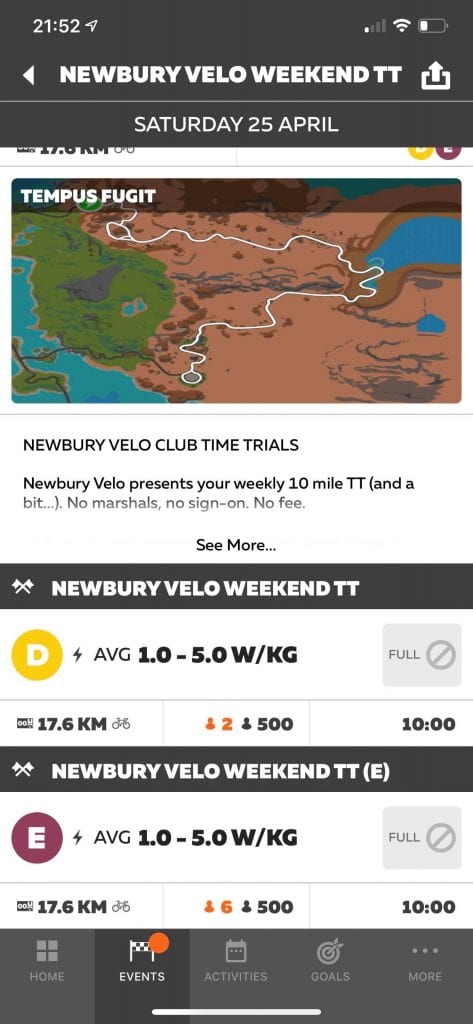It wasn’t until my late 30’s that I realized how passionate I was about building communities. It’s something I’ve naturally done since my teens, yet I didn’t think there was anything special about this until others pointed it out.
Community is a big part of why I love cycling – the camaraderie of a group exploring new roads. The rush of pushing hard in a chain gang as the tarmac hums past. Perhaps that’s why I was immediately drawn to Zwift – because the centrality of its community was immediately clear from the moment I first signed on.
One thing I try to do here at Zwift Insider is pay attention to big events. Perhaps it’s the “community organizer” in me, but it’s fascinating to observe how certain events launch with limited success, while others explode in popularity.
A recently-launched event that has caught my eye is the Newbury Velo TT. The organizing team includes Glen Knight (the leading mastermind behind the KISS series that helped evolve Zwift racing in many ways) and Rachael Elliot (a super-strong racer with a Zwift story like no other). Since I know them both personally, I decided to reach out and learn what they’ve done to create such a successful event.
There are lessons here for anyone trying to create a successful Zwift event. There are lessons here for anyone looking to organize a community. And there are also lessons here for Zwift HQ! So let’s dive in.
A Brief History of the Newbury Velo TT
Glen Knight, Rachael Elliot, and others started the IRL Newbury Velo team in November 2019. Glen says, “We had a vision to build relationships with other cycling clubs to try and change the way cycling clubs operate. We were different. And this was recognised very quickly. Within 6 weeks we had over 100 paid members of our new club. And now, 5 months old and we have 160. Making us one of the biggest clubs in the region.”
Finding an IRL 10-mile TT under normal circumstances is easy in the area where Glen lives, but when the coronavirus epidemic forced race cancellations, the Newbury Velo team decided to run the TT races on Zwift. Glen says, “On 25th March we had our first Wednesday night TT. We promoted this event to local and regional cycling clubs. Within the time trialing groups and the forums. Deliberately targeting British time trialists. We had 126 riders. But the key was the banter in the forums, in the clubs. And the race report after the event. We promoted this differently and deliberately away from traditional Zwift events/groups.”
Due to the success of the Wednesday events, Newbury Velo decided to add a Saturday TT, with the first being over Easter weekend (April 12). They promoted the event to local clubs and associations and in their second event (April 19) hit the max of 500 riders allowed by Zwift in any one “category” for a TT event. Glen was surprised when they hit that cap – he didn’t know such a limit even existed!
For April 26th they requested two categories so the max would increase to 1000 riders – and that event filled up as well. Glen reached out to Zwift in the days before the event to have more categories added, but was unable to get a response, so some interested riders weren’t able to take part.
And that brings us to this week. At this point, Zwift’s events team has set up the weekend TT with just two categories – so it’s still capped at 1000 riders. Glen and his team are hoping Zwift will update the event and expand it before Saturday rolls around.
Lessons for Organizers
If you’re looking to launch an event on Zwift, or wanting to increase turnout for your existing event(s), there are a few lessons to learn from Newbury Velo’s phenomenally successful approach:
- Find a niche… with broad appeal: your ride should be distinct from other events, but appealing to a large number of riders. Ask yourself: what makes it special? What hole does it fill in the Zwift calendar? Newbury Velo’s TT is an event style that isn’t seen often on Zwift’s calendar, and the races are short enough that people can easily fit them into their ride plans.
- Stand out from the crowd: Newbury Velo puts in the extra effort to police their race results, write up race reports, create beautiful graphics displaying winners, and more. This personal touch makes Newbury Velo’s TT events stand out from Zwift HQ’s TT events, which are the most commonly-seen TT races on the calendar. Race organizers especially should take note here: this effort shows riders you care, and is a key part of getting them to return.
- Do your own (guerilla) marketing: as Glen explained above, most of their marketing has been personal outreach via their IRL network of British cycling clubs. If you want more signups, don’t just wait for people to see your event on the Companion app – share it with your network! Get creative. Nobody is making money here, so you probably won’t do any paid outreach – but there’s a lot you can do for free.
- Provide support: if your event is pulling in new Zwifters, they’ll have questions. Glen and his team have helped numerous new Zwifters sign up for ZwiftPower, get their equipment working, etc. The more you support participants, the better their experience in your event will be, the more loyal their attendance will be, and the more they’ll share your event with others.
Non-Zwifter Evangelism
Not only is the Newbury Velo Weekend TT hugely popular – it’s attracting a high percentage of non-Zwifters. According to Glen, “We know this because of the high number of people we’ve helped get signed up to ZwiftPower and the advice we’ve given around equipment, etc.”
There’s a valuable lesson here for Zwift HQ: community organizers can and will attract new users to the platform. They’ll even do much of the customer support work, if those community organizers are given real ownership of the events they host on your platform.
The Power of Passion
The story of Newbury Velo’s rapid success with these TT events perfectly illustrates what can be accomplished by a small band of passionate volunteers on a platform like Zwift. Event organizers are able to reach out to their personal networks in a way Zwift cannot. They can channel their passion into creating an event that stands out from the crowd. And crucially, they’re able to attract new Zwifters in a way Zwift cannot!
Eric Min understands this – he’s said in interviews that Zwift doesn’t need to be the event organizer, but instead they need to be the platform that organizers use. He’s also said that Zwift really needs to get out of their own way when it comes to letting the community manage their own events. This is certainly the case with Newbury Velo’s events, which Glen (an IT expert) says he would love to manage, if Zwift would give him that ability.
Feature Requests
When I asked Glen what he would request of Zwift in order to make his job as event organizer easier, he knew exactly what he’d ask for first: “Zwift could control the calendar and create event entries and then giving organisers the ability to make changes to that scheduled slot. So they still control the time/date the event is scheduled for but they don’t have the hassle and the workload of making the little changes to things like descriptions, course, lap numbers, categories etc. I understand this may be coming to some extent with Club functionality.”
Indeed, I’ve heard Zwift is hard at work trying to release some “event editing” tools to ride organizers, to offload some of the work the overtaxed events team has taken on as Zwift numbers soared in recent months. These tools won’t come a minute too soon for event organizers, and it will be sweet relief to Zwift’s events team as well!
(The situation today is far from ideal: I’ve had many club leaders, Zwift team heads, and event organizers reach out to me for tips on getting their events onto Zwift’s calendar, or getting their events modified. I can only imagine the number of requests flooding into the events team’s support ticket system.)

Big Names vs Big Communities
With so many event requests coming in, Zwift is being forced to perform a balancing act. I think it’s fair to say this has led to some frustration on all sides.
One team manager (who asked to remain anonymous) shared with me that he has been trying to get just one official event onto Zwift’s calendar for his fast-growing Zwift club, which now has 2100 members. (They’ve been holding regular club Meetups, but those are severely limited when it comes to attracting hundreds of riders.)
He can’t seem to get a response from Zwift, but at the same time, his country’s governing body was able to quickly get events created. As he sees it, “They are just a COVID blow in and will leave Zwift just as quickly as they joined.”
There are two sides to every story, of course. One can’t blame Zwift for wanting to play nice with the cycling governing bodies. But Zwift, by its own admission, needs to do a better job of empowering the community to organize their own events. Doing so helps people find a place on Zwift. It keeps veteran community organizers happy. And it brings more users to Zwift. There’s no downside – it’s a win-win-win situation.
The Way Forward
It’s only fair to acknowledge that coronavirus has placed everyone on the back foot, Zwift included. I don’t believe for a second that Zwift doesn’t value what community event organizers bring to the table. At the same time, organizers are understandably frustrated by the continued lack of tools available to help them successfully host events.
The way forward, it seems, is for Zwift to fast-track the development of some basic event management tools. The good news is, this is being done! These tools need to work for public events, but also allow organizers to create private events for their clubs. Hopefully Zwift will be able to deliver these tools in a matter of the next week or two, instead of a delayed launch months out.
Event organizers are a smart lot, and quite adaptable when it comes to tools. They would happily take a rudimentary interface and a few bugs in place of having their events negatively impacted because Zwift’s events team isn’t able to make needed changes in a timely manner.
Your Thoughts
What makes a community-driven event successful, in yours eyes? And what can Zwift do to better empower the community’s event organizers? Share your thoughts below!

